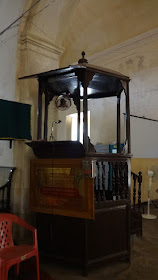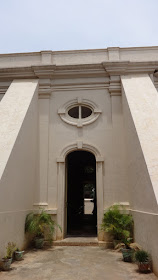Schwartz Church, Thanjavur
Schwartz
Church takes pride of place as one of the oldest churches of south India and
was constructed during the reign of British in India. Today, it is not only a
key tourist destination of Tamil Nadu but also has huge religious significance.
Schwartz Church in Thanjavur is a legacy of the city’s colonial past. It is
located in the Thanjavur Palace garden. The church is surrounded by pretty
lawns and has many trees, making it a tranquil retreat from the chaos of the
city.
The
Schwartz Church adjacent to the Sivaganga Park in Thanjavur was built by
Raja Serfoji, the great Maratha King, in 1779 AD to show his admiration,
gratitude and respect for the Danish Missionary,
Rev. Friedrich Christian Schwartz who was born at Sonnenburg, Prussia.
Schwartz Church is still seen as a sign of open-mindedness and secular attitude
of the rulers towards various religious beliefs.
Fr.
Schwartz was his tutor and mentor. His saintly approach and integrity left a
good impression on the young Raja. Schwartz was instrumental in getting
the kingdom from the British who were about to take over Thanjavur region as
there was no legal heir. He was not happy with the British rule and frequently
complained of the insincerity and avarice of the British.
In the
Church, there is a monument or tablet made by John Flaxman on the orders of the
Raja of Thanjavur that shows the King holding the hand of the dying Lutheran
missionary-evangelist whilst receiving his blessing. The monument is in white
marble and is a popular attraction for tourists.
A legacy
of Thanjavur’s colonial past, Schwartz Church continues to be cited as an
important shrine by believers of the Christian Faith of the God’s work being
carried across the seas by those entrusted with it. Rev. Schwartz was an
early pioneer in the field of education and was responsible for founding many
Christian mission schools in this area to impart education to the natives. He
was the first to introduce English in St. Peter's school of Thanjavur. This
school is one of the oldest schools in India.
Schwartz
used to live on the church premises in the north-west part of the
church. Schwartz in his capacity as a Danish priest had close relationship with
the British East India Company and was quite familiar with higher officials at
Madras. There is a monument to Rev. Schwarz by John Bacon arranged by the
British East India Company in St Mary's church at Chennai (formerly
Madras). There is a well-known school named after Rev. Schwartz in Ramanathapuram,
Tamilnadu and Abdul Kalam, the former President of India, was an old student of
that school.
Location
Schwartz
Church is situated in Thanjavur in Tamil Nadu and is to the east of the famous
Sivaganga Tank. It is regarded as a legacy of the colonial past and was founded
in 1779 by the Danish missionary, Reverend Frederick Christian Schwartz. The
church has been named in his memory.
History
Schwartz
Church was constructed by Raja Serfoji in 1779 AD as a token of his affection
for the Danish missionary, Reverend Frederick Christian Schwartz. The Nayaks
and the Cholas controlled the kingdom of Thanjavur somewhere in the 17th
century. Later, the Marathas reigned over Thanjavur and made this city the
capital of their kingdom. The English overpowered the Marathas in 1749 and
instated power in the region. Later, the French too entered the power struggle.
Schwartz Church was planned and constructed under their control during this
time.
At a
distance of 2 km from Thanjavur Railway Station & 750 km from Old Bus
Station & 500 meters from Brihadeeswarar Temple, Schwartz Church, also
known as Fort Church, is located near Brihadeeswarar Temple in the Thanjavur
Palace garden just north of the Sivaganga Tank, was built by Raja Serfoji in
1779 in appreciation of his teacher, the Danish missionary FC Schwartz who died
in 1798.
When
Schwartz died in 1798, Serfoji II, the Maratha ruler donated a striking piece
of white marble that was made by John Flaxman and this is seen at the western
end of the Schwartz church. The marble piece has engravings showing the dying
missionary, blessing King Serfoji surrounded by his ministers.
The
French Connection
It is
believed that the constructions of Schwartz Church took place somewhere during
the late 17th and early 18th century. That’s why; it mirrors the heritage
settings of Thanjavur of that era. For instance, the architecture and design in
the Church has a typical French touch while the amazing arches, the gateway and
the foreground heights are also reminiscent of French style of construction.
The
Church
Schwartz
Church is a tranquil and lovely place. It’s most famous attraction is a marble
tablet. When he died, Serfoji donated this tablet, made by John Flaxman, to
Schwartz Church and you can see it even today at the western end of the church.
The tablet portrays the dying missionary sanctifying his royal patron who is
encircled by ministers and students from the school he founded. Check out the
striking carvings on the tablet.
The
architecture of the church shows a distinct French influence in its arches,
elevation and the doorway. The peaceful environs of the church, with its
luxuriant green lawns and trees, will make you forget that you are in the
middle of a crowded city.
The
west-side of the church is famous for its amazing marble tablet that was given
by the Maratha ruler of those times, Serfoji II. It was gifted in 1779 when the
Danish missionary breathed his last. The tablet represents the Father amongst
his ministers and pupils from the school that he helped establish.
The
church is known for its greenery and natural surroundings. There is lots of
greenery around the place that makes the church surroundings serene and
peaceful, the perfect setting for a religious place.
Tourist
Information
The best
time to visit the church is from October through March. The church is open from
0600 Hrs to 1900 Hrs on all days of the week. There is no entry fee charged by
the authorities. Pets are not allowed.
Connectivity
By Road:
Thanjavur
is well-connected to other parts of the state by state transport buses. The
road network is excellent.
By Train:
The
nearest railway station is Thanjavur Railway Station.
By Air:
The
nearest airport is Tiruchirappalli airport.



























